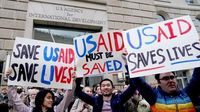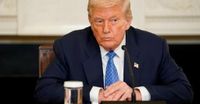On August 13, 2025, a sharply divided federal appeals court handed President Donald Trump a significant legal victory, ruling that his administration can continue to withhold billions of dollars in foreign aid that Congress had already approved. The 2-1 decision by the U.S. Court of Appeals for the District of Columbia Circuit reversed a lower court’s order and has far-reaching implications for the balance of power between Congress and the White House, as well as the future of American foreign assistance programs.
The case at the center of this decision arose when a coalition of international aid organizations, long reliant on U.S. grants, sued the Trump administration after it abruptly froze and began terminating foreign aid payments. These cuts included nearly $4 billion for global health programs scheduled through September and more than $6 billion for HIV/AIDS initiatives funded through 2028, according to NPR and The New York Times. The administration’s actions followed President Trump’s first day in office, when he called foreign aid spending on overseas disease and poverty programs “wasteful” and initiated a sweeping review of U.S. foreign assistance policies. Almost immediately, he placed a moratorium on new funding for projects administered by the State Department and the U.S. Agency for International Development (USAID), which managed about $30 billion annually in global health and development programs before being essentially dismantled.
The initial legal response came in March 2025, when U.S. District Judge Amir Ali issued a preliminary injunction against the Trump administration’s funding freeze. Judge Ali found that the administration had unlawfully delayed funds appropriated by Congress, violating the Constitution’s separation of powers and ordering the government to make available all foreign assistance funds designated for fiscal year 2024. This included the billions earmarked for global health and HIV/AIDS programs. However, the Trump administration appealed, setting the stage for this week’s consequential ruling.
In Wednesday’s decision, the appellate panel—composed of Judge Karen LeCraft Henderson (appointed by George H.W. Bush), Judge Gregory G. Katsas (a Trump appointee), and Judge Florence Y. Pan (a Biden appointee)—concluded that the aid organizations lacked the legal standing to challenge the president’s funding cuts. The court interpreted the Impoundment Control Act of 1974, which was designed to regulate a president’s power to delay or withhold funding already appropriated by Congress, and found that only the Government Accountability Office (GAO), Congress’s independent watchdog, can sue the executive branch over alleged impoundment.
“Here, the [Impoundment Control Act] created a complex scheme of notification of the Congress, congressional action on a proposed rescission or deferral and suit by a specified legislative branch official if the executive branch violates its statutory expenditure obligations,” Judge Henderson wrote in the majority opinion. “It does not make sense that the Congress would craft a complex scheme of interbranch dialogue but sub silentio also provide a backdoor for citizen suits at any time and without notice to the Congress of the alleged violation.” Judge Katsas concurred, emphasizing the statutory process established by Congress for handling such disputes.
The court’s decision overturned the lower court’s preliminary injunction, effectively giving the Trump administration the green light to continue freezing or terminating the contested foreign aid funds. The ruling also noted that the federal government had already paid “substantially all of the amounts owed on existing contracts for work” earlier in the year, but left open the possibility of further cuts and terminations for future grants and programs.
Judge Florence Y. Pan issued a forceful dissent, warning that the majority’s reasoning undermined the constitutional balance of powers and Congress’s control over federal spending. “It is our responsibility to check the President when he violates the law and exceeds his constitutional authority. We fail to do that here,” Pan wrote. She argued that the court’s decision “degrades that ability of the balance of powers to be ‘security against tyranny’” and criticized her colleagues for departing from impartial appellate review to “announce a new and sweeping rule in the President’s favor.” Pan’s dissent echoed concerns from legal scholars and advocates who see the ruling as a dangerous expansion of presidential authority over the federal purse.
Steve Vladeck, a Supreme Court analyst for CNN and a Georgetown law professor, called the appellate court’s reasoning “nonsensical” and warned that it effectively prevents parties from bringing constitutional challenges to the president’s budget decisions. “It’s difficult to imagine that the full D.C. Circuit won’t want to rehear this ruling,” Vladeck said. “If it stands, Congress is only going to sue when it’s adverse to the president. The real problem is the court is taking a textbook violation of the Constitution and minimizing it.”
International aid groups and their legal representatives condemned the decision and vowed to continue fighting. Lauren Bateman of the Public Citizen Litigation Group, lead attorney for several plaintiff organizations, announced plans to “seek further review from the court.” She added, “In the meantime, countless people will suffer disease, starvation, and death from the Administration’s unconscionable decision to withhold life-saving aid from the world’s most vulnerable people.” Mitchell Warren, executive director of the AIDS Vaccine Advocacy Coalition, echoed these sentiments, saying, “Time and again, this administration has shown their disdain for foreign assistance and a disregard for people’s lives in the United States and around the world. More broadly, this decision, which we will appeal to the extent possible, further erodes Congress’s role and responsibility as an equal branch of government, and the majority opinion makes the court complicit.” Elisha Dunn-Georgiou, president of the Global Health Council, said in a statement, “While today’s decision is very disappointing, Global Health Council will continue our efforts to protect the global health sector and the critical work being done around the world.”
Despite the court’s ruling, the legal and political fight over foreign aid is far from over. The Government Accountability Office has repeatedly found that the Trump administration illegally impounded funds authorized by Congress, including money meant for public infrastructure and early child education, and has more than 40 ongoing investigations, some focused on foreign aid. Yet the GAO has so far refrained from suing, with Comptroller General Gene Dodaro describing litigation as a last resort.
Meanwhile, the decision’s implications for U.S. foreign policy and the separation of powers are profound. By limiting legal standing to the legislative branch, the ruling makes it much harder for outside entities to challenge presidential impoundment of congressionally approved funds. For now, President Trump’s authority to freeze or terminate foreign aid remains intact, leaving Congress and advocacy groups searching for new avenues to assert their constitutional role in federal spending.
The struggle over who controls the nation’s purse strings—Congress or the president—has rarely felt so immediate or consequential. With billions of dollars and millions of lives at stake, the outcome of the next legal or political battle could shape America’s global footprint for years to come.



